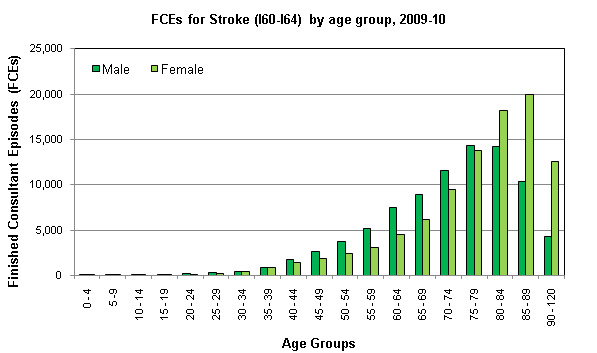IN THIS SITE...

- NHS Choices: Stroke
- The Stroke Association
- Inpatient Data
- Self Service
HES on... Stroke
What is Stroke?
A stroke occurs when blood flow to areas of the brain is disrupted, this can be due to:
- ischemia - lack of blood flow, caused by occlusion of blood vessels usually by thrombosis or embolism
- haemorrhage - rupture of fragile blood vessels in the brain.
As a result the affected brain area is unable to function properly, leading to problems with movement, speech and sight.
Who does it affect?
NHS Choices states that:
- In England, strokes are a major health problem. Every year over 150,000 people have a stroke and it is the third largest cause of death, after heart disease and cancer. The brain damage caused by strokes means that they are the largest cause of adult disability in the UK.
- People who are over 65 years of age are most at risk from having strokes, although 25% of strokes occur in people who are under 65. It is also possible for children to have strokes.
HES figures for 2009-10 show a similar trend that over 79% of people who are treated in hospital for a stroke are 65 and over and 21% being under 65. In total there were over 180 thousand episodes of inpatient care for strokes in 2009-10.
 |
HES facts and figures
HES data for stroke (primary diagnosis codes I60-I64 in ICD-10) shows that in 2009-10:
- the majority (85%) of hospital admissions for stroke are emergency admissions
- the average (mean) time that patients remained in hospital was 20.4 days
- 40% of patients who are treated in hospital with stroke did not undergo an operative procedure. Of those that did, the three most common procedures were:
- diagnostic imaging of central nervous system (U05 in OPCS 4.5)- 39%
- rehabilitation for other disorders (U54 in OPCS 4.5) - 7%
- diagnostic imaging procedures (U21 in in OPCS 4.5) - 2%.
- it was responsible for 182,944 episodes of admitted patient care, accounting for 2,095,661 occupied bed days.
More information on this topic is available from NHS Choices through the following:
- NHS Choices - Stroke
- The Stroke Association

